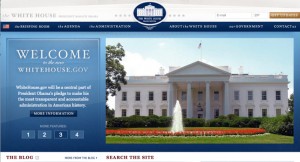Obama Hints At Tech Spending In Address
January 20th, 2009 — Chris Van BurenEstimates for the size of the crowd on the Washington mall today have settled to somewhere around two million. Befitting a crowd of such grandeur, Pres. Obama’s inaugural address outlined many of the largest problems facing America today. Yet, as I stood near the Washington monument (freezing), I was pleased to hear the recently sworn-in president plant this quote about technological infrastructure:
We will build the roads and bridges, the electric grids and digital lines that feed our commerce and bind us together.
As I have written about in previous posts, the Obama camp seems particularly keen to bridge digital divides. They have talked about funding public works programs to increase broadband access in rural areas and using the web to make government more transparent and responsible.

As his speech suggests, Pres. Obama understands that such investments not only harvest savings for government and private business, but also, and perhaps more importantly, catalyze democratic discourse. This is almost certainly what he means in suggesting that digital networks “bind us together.” Just as real highways in theory increase civil society by linking people who were formerly geographically separated, so the information highway brings ideas and groups together in dialogue, if anything at a more dramatic rate.




 Click Here
Click Here